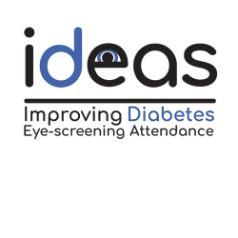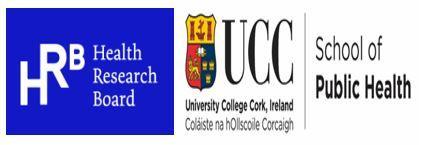In This Section
- Home
- About ESPRIT
- Our Research
- Health Research Board Research Leader Award
- Health Research Board (HRB) Applied Partnership Award
- The Choosing Healthy Eating for Infant Health(CHErIsH) Study
- Reducing Maternal Stress in Ireland
- GPSEP-way
- EPICC
- CDA - Chronic Disease Prevention
- CDA - Diabetic Foot Disease
- REACT
- SCaRLeT
- Self-management Support in Cancer Care
- PPI (Public and Patient Involvement)
- People
- Training & Events
- Dissemination
- Athena SWAN

Health Research Board, Definitive Interventions and Feasibility Awards (DIFA) (2015 - 2020)
About IDEAs
The IDEAs study investigated the feasibility of an intervention to increase diabetic retinopathy screening attendance. We carried out a pilot trial of the intervention in general practices across Ireland.
What is diabetic retinopathy?
Diabetic retinopathy is a serious and common condition that affects the sight of people with diabetes and can cause blindness. In Ireland, retinopathy affects 8% of the population over 50 years with type 2 diabetes, that’s approximately 10,000 people. It is one of the leading causes of blindness among adults of working age. More information on retinopathy is available here.
Why is screening important?
With regular screening retinopathy can be picked up earlier and treated, which can help prevent or delay sight loss. The success of screening is dependent on people attending when they are invited. Screening is effective and provided free of charge by the national retinopathy screening programme in Ireland, known as RetinaScreen. You can visit the RetinaScreen web site here.
Why are we doing this research?
We want to find a way to improve the uptake of screening. Recent estimates suggest uptake of the national screening programme, RetinaScreen, is 67.2%. As most of the routine management of type 2 diabetes takes place in general practice, it is an opportune setting for interventions to improve uptake of screening.
We developed our intervention with the input of people with diabetes and health care professionals and examined whether the intervention is a practical and acceptable way of increasing registration for screening by family doctors, and whether the intervention increases screening visits among people with diabetes.
What does our intervention involve?
Parts of the intervention target practice staff to help them to deliver reminders to patients: training in audit, a practice audit of uptake, electronic prompts on patient records, and practice reimbursement. Other parts are designed to encourage patients to attend screening: face-to-face, phone and postal reminders along with an information leaflet. You can read more about the study on our website here.
Further information
For further information about this study, please contact Dr Fiona Riordan, School of Public Health UCC, at fiona.riordan@ucc.ie

